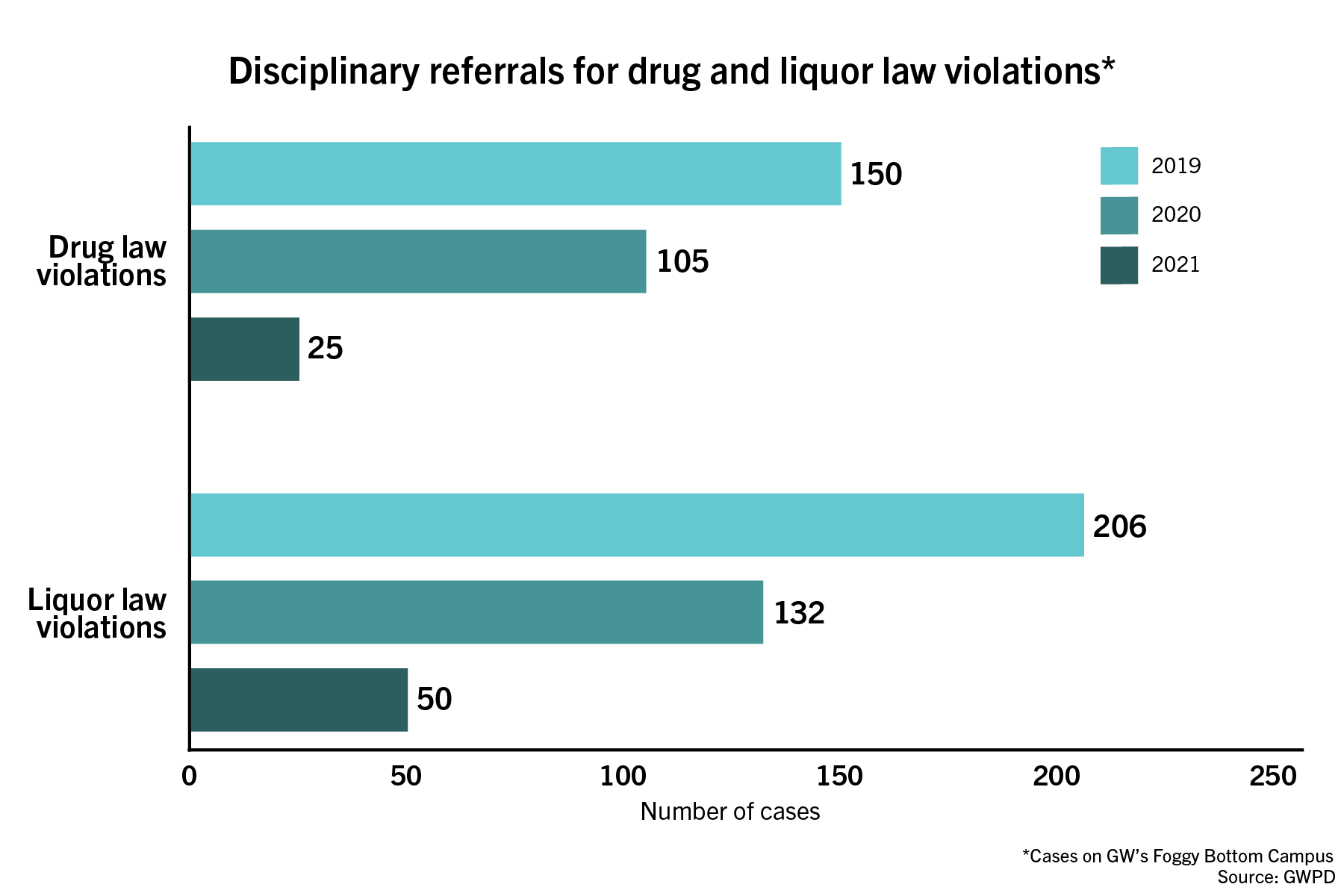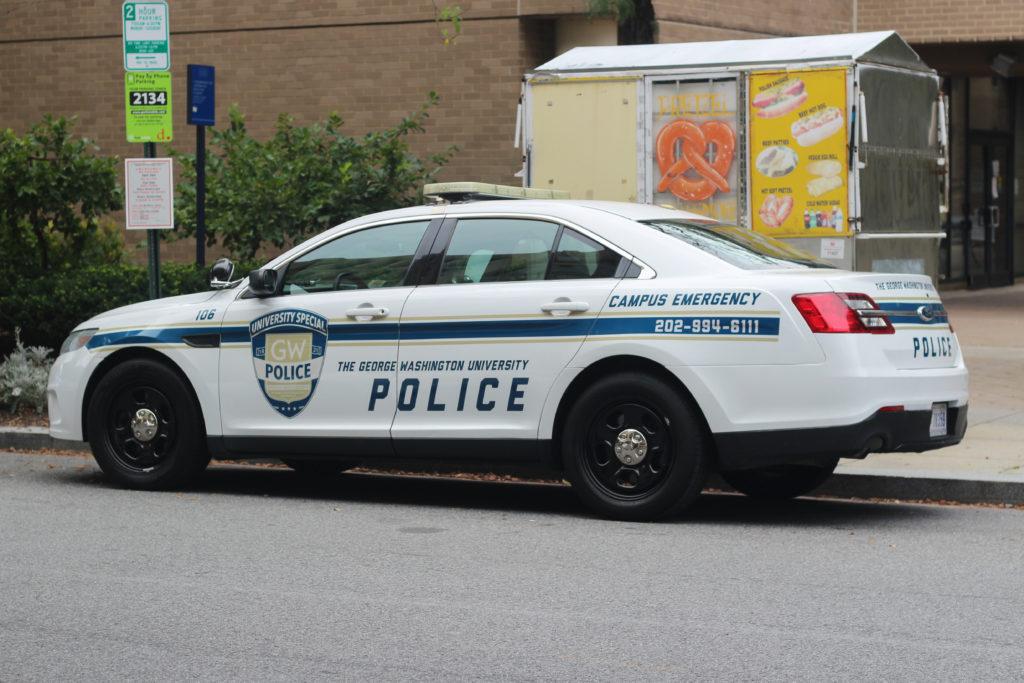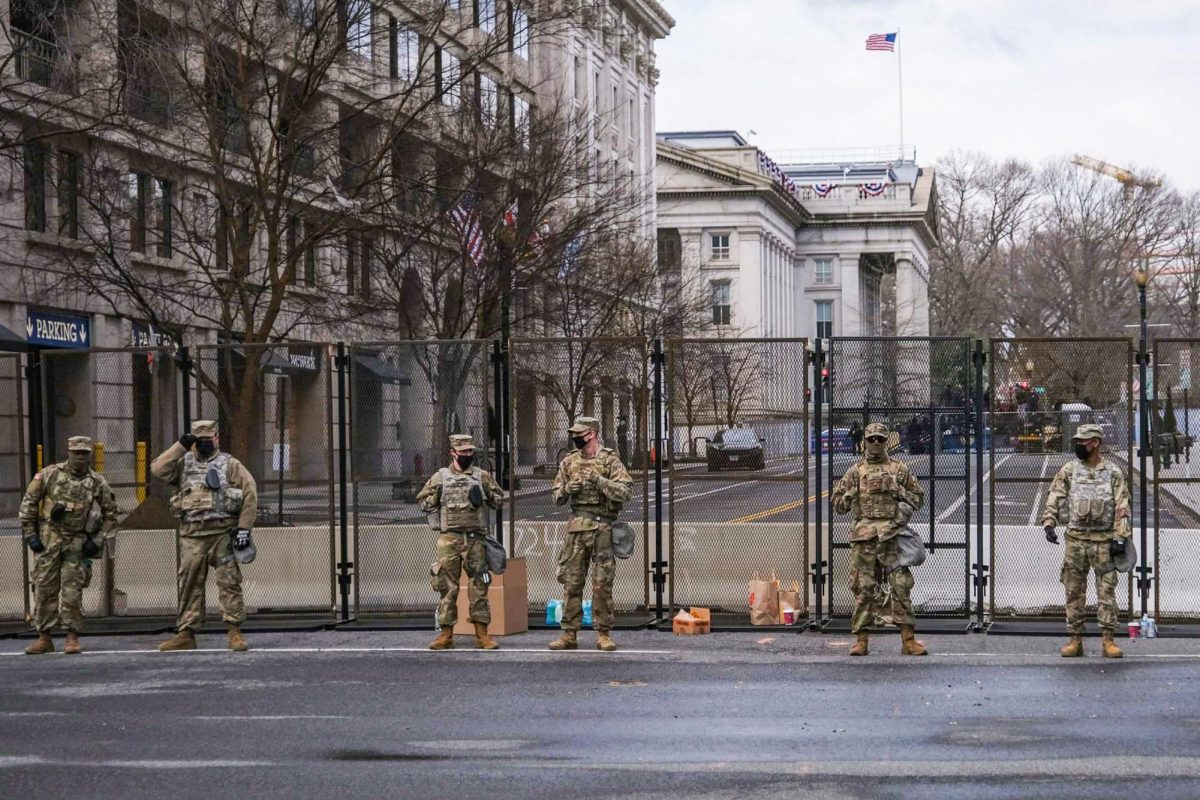Drug and liquor law violation referrals plummeted to record-low levels in 2021 while reports of stalking and fondling on campus jumped back near pre-pandemic numbers, according to GW’s Annual Security and Fire Safety Report released late last month.
The report shows the number of disciplinary referrals for liquor and drug law violations dropped by two-thirds from 2020 to 2021 – the lowest total in at least a decade – but stalking and fondling reports on campus more than quadrupled. GW Police Department Chief James Tate said increased student awareness and education about campus crime reporting may account for the rise in stalking and fondling reports, but defining the reason for the drop in liquor and drug law referrals is more challenging.
“GWPD aims to provide a safe and secure campus for all members of the University community,” Tate said. “It is difficult to pinpoint one reason or another as to why reports to GWPD may have increased or decreased one year versus another.”
GWPD received 20 reports of fondling last year, exceeding the most recent pre-pandemic total of 12 in 2019 before the number fell to four in 2020. Last year’s count marked the highest volume of fondling reports since GWPD received 23 in 2018.
The department also received 16 reports of stalking in 2021, up from four in 2020 but falling below the 23 reports logged the year before that.
The federal Clery Act requires universities to release reports on campus security and fire safety annually.
Tate said GW continues to encourage students to “take care of each other” and educate themselves about crime prevention.
“It is encouraging when students feel more comfortable providing a report and are able to receive support services,” Tate said in an email.

Nicholas Anastacio | Graphics Editor
The report shows seven fires took place in Foggy Bottom residence halls in 2021, six with damage expenses totaling less than $10,000, except for an oven fire in JBKO Hall last October that cost between $10,000 and $25,000. A University spokesperson did not return The Hatchet’s request for the cost of GW’s repairs to JBKO.
Disciplinary referrals for liquor and drug law violations fell from 132 and 105 reports in 2020 respectively – when most students were not on campus because of COVID-19 – to 50 and 25 last year, while pre-pandemic data from 2019 showed 206 and 150 alcohol and drug law referrals. Tate said “certain reporting” decreased in 2021 because of GW’s COVID policies that minimized the presence of students on campus, even though campus reopened to the entire student body halfway through 2021.
Witt Kolsky – a sophomore and member of the Division of Safety and Facilities Student Advisory Board, which helps the University identify campus safety concerns among the student body – said the lack of students on campus during the first half of 2021 skewed campus crime data. He said Tate did not mention any enforcement policy changes that would account for the drop in referrals for liquor and drug law violations.
“It’s going to take probably about two or three more years before the numbers are able to actually show significant trends that aren’t being affected by the pandemic still,” Kolsky said.
Tate said the lack of students on campus through pandemic-related closures led to a 75 percent drop of campus crime during 2020.
The Georgetown University Police Department recorded a similar spike in stalking reports, which jumped from 13 in 2020, according to their security and fire safety report. The department received one more report of fondling in 2021 than 2020 with seven last year, the report states. American University Police Department registered four reports of stalking on campus in 2021 – down from 10 in 2020 – and four total reports of fondling through 2019, 2020 and 2021.
The number of disciplinary referrals for liquor and drug law violations has plunged on Georgetown’s and American’s campuses since 2019. Georgetown’s referrals for liquor law violations dropped from 251 three years ago to to 21 in 2021, and those for drug law violations have fallen from 66 in 2019 to three last year. At American, liquor law violation referrals fell from 442 in 2019 to 215 in 2021, and drug law referrals decreased from 170 in 2019 to 29 in 2021.
GW’s annual security and fire safety report states that six of the 20 fondling reports in 2021 occurred in nonresidential University buildings or outdoor spaces, like academic or common areas, but nearly all cases in 2019 and 2020 took place in residence halls. A quarter of the 16 reported stalking incidents took place in residence halls, compared to about half in 2020 and 2019.
Experts said the rise in stalking and fondling reports shows that students are more aware of their experiences that might be a reportable offense. They said the pandemic cannot entirely explain the drop in liquor and drug law referrals because the timing of students’ departure and return to campus doesn’t align with the decrease.
Laura Egan, the senior director of programs at the Clery Center – a national nonprofit organization that helps universities carry out the Clery Act requirement for campus crime reporting – said nationwide reports of fondling or stalking have not mirrored the uptick at GW.
“That’s where, without a little bit more context, sometimes the Clery crime statistics leave more questions than answers,” Egan said. “But that’s okay.”
She said officials added categories like stalking, dating violence and domestic violence to the report in 2014 to specify crime classification and educate students about what constitutes a crime, which may result in an increase of reports.
“I would say it’s very positive that you have those numbers because that means that people are reporting that,” Egan said. “They are understanding that what they might be experiencing is reportable, and that is being verified by being counted here as a crime statistic.”
David Weisburd, a professor of criminology, law and society at George Mason University, said the 75 percent drop in disciplinary referrals for drug law violations between 2020 and 2021 is statistically significant, but the timing does not entirely reflect a trend that could be related to COVID-19. He said the pandemic cannot entirely explain a drop in liquor or drug law violation referrals that drastic, and changes in policy enforcement usually account for similar decreases.
“Given this data, I would suggest something’s going on with the police,” Weisburd said.
He said the number of stalking and fondling reports may reflect circumstantial situations instead of major trends because the relatively small sample size leaves room for potential errors in crime analysis, like the exaggeration of trends.
Jane Palmer, an associate professor of justice, law and criminology at American University, said Clery crime statistics are not an accurate representation of campus crime and instead reflect campus reporting culture. She said stalking and fondling reports are likely to rise if students are comfortable with their options to report crime.
“There’s less reporting if we have a gap in hiring, like someone leaves and it takes a while to hire the advocate,” Palmer said. “Or if we get a really great advocate that through word of mouth, students are like ‘I’m totally comfortable reporting to this person,’ whereas before the advocate was nice, but not somebody they wanted to tell their trauma to.”








